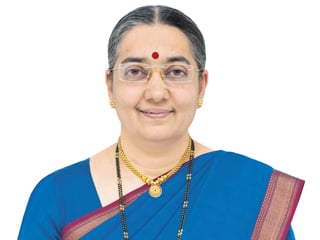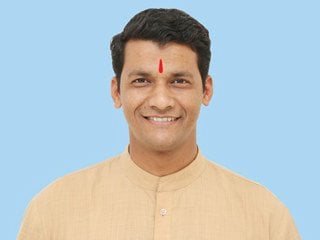Difference between Hindus by birth of the current times who denigrate Deities by nicknaming them and our ancestors who tried to remain in constant communion with God by giving Their Names not only to temples but also to the people
Contents [hide]
- 1. One forgets God, Dharma and culture when experiencing happiness derived from modern science
- 2. Our ancestors who named their children after Deities and called out to them by those names to be able to remain in communion with God
- 3. Today children are given meaningless names, they are called out to with nicknames distorted from the original name as a result of which both the parents and children are deprived of vibrations of Deities and accrue sin
- 4. From their naming of children, kings and temples as per Scriptures it becomes clear that the lives of our ancestors were spiritualised
- 5. Following the names given by ancestors is our spiritual practice

1. One forgets God, Dharma and culture
when experiencing happiness derived from modern science
We hear of how man has made tremendous progress with the changing times. Scientists have made discoveries in various fields and today man is capable of even going to planets beyond the moon. Every day we hear and read such news. But in reality is this progress ? It is indeed unfortunate that in the process of experiencing happiness derived from modern science today we are on the way to forgetting our Deities, Dharma and culture.

2. Our ancestors who named their children
after Deities and called out to them by those
names to be able to remain in communion with God
The greatest gift that Hindu culture has given us is becoming one with God, that is moksha (Final Liberation). It is essential to remain in communion with God to be able to achieve this and the easiest way to achieve this is chanting the Name of God continuously. If our mind, intellect and subconscious mind are focussed on one out of several Names of God then this communion can be achieved and to be able to achieve that in the olden days they would name their children as Keshav, Madhav, Pandurang, Radha, Sita, Gauri etc. and call out to them with those names.
3. Today children are given meaningless names,
they are called out to with nicknames distorted
from the original name as a result of which both the parents
and children are deprived of vibrations of Deities and accrue sin
Today parents give their children meaningless names such as Chintu, Pinky, Mintu etc. which are not in keeping with Scriptures. They also distort good names e.g. Aniruddha is called Anya, Pandurang is called Pandya or Pandu. This is also done with names of Deities. Even in Pune, the seat of knowledge, adjectives such as Chimnya, Patrya, Ek Khambi are prefixed to Ganapati, Khunya to Maruti. This is also a kind of denigration and prevents us from deriving vibrations of the Deity. The same rule holds good for distorting the name of an individual. Therefore, by denigrating the name of an individual we are accruing sin.
4. From their naming of children,
kings and temples as per Scriptures it becomes
clear that the lives of our ancestors were spiritualised

4A. Understanding the science of
our ancestors of naming babies and making it a part of life
When a baby is born it is named after an in-depth study of the lunar asterisms at the time of its birth, time of birth etc., with a particular letter which would be conducive for its spiritual progress. In Hindu culture a baby is named with that letter which gives the baby spiritual vibrations through that name amidst performing of a religious ritual, a science which our ancestors had identified, studied and adopted completely in life.
4B. By naming kings as per Scriptures,
kshatravrutti (Warrior attitude) was awakened within them
There is historical evidence to show that kings too were named as per Scriptures, for example Yashovarman, Jaivarman, Rajendravarman, Udayadityavarman etc. Pronouncing these names would initiate chanting the Name of God and also awaken the warrior attitude.
4C. Temples were named ‘Parabrahman’ ‘Param Vishnulok’, ‘Shri Tribhuvaneshwar’ etc.
History also shows evidence of temples being named after Deities. In Indonesia, the temple ‘Prambanan’ was actually ‘Parabrahman’ with idols of Brahma, Vishnu and Mahesh. In the 9th century, in Cambodia, King Yashovarman built the city of Yashodharpur and the temple of ‘Param Vishnulok’ whose name has been distorted today to ‘Angkor Wat’. Names such as Shri Tribhuvaneshwar, Hariharalay etc. are heard even today.
5. Following the names given by ancestors is our spiritual practice
All this shows how in the ancient times Spirituality was a part of life because of which there was prosperity everywhere. Our great Sages identified the Principles of Deities through the power of Their penance and then named Them accordingly. Hence each one of us has to realise that following these names is our duty and spiritual practice and through that we will benefit at all levels. Dharmashikshan (Education on Dharma) is necessary to become aware of this and there is no alternative to imparting Dharmashikshan than by forming a Hindu nation.
– Shri. Satyakam Kanaglekar, Siem Reap, Cambodia

Till date Cambodia has been attacked by several empires. Taking advantage of the ego and internal conflicts of Khmer kings, the neighbouring countries Shyam Desh (Thailand of today) and Champa Desh (Vietnam of today) have attacked the Khmer empire on several occasions. This empire was destroyed in the 15th century. From the 12th to the 15th centuries sculptures at Angkor Wat have borne several attacks one of them being that on a celestial beauty (Apsara) in the temple showing bullet marks.
-Shri. Vinayak Shanbag, Cambodia (March 2018)

 Shri Chitashakti (Sau.) Anjali Gadgil obtaining blessings of Shri Devkalimata, Family Deity of Prabhu Shriram...
Shri Chitashakti (Sau.) Anjali Gadgil obtaining blessings of Shri Devkalimata, Family Deity of Prabhu Shriram...